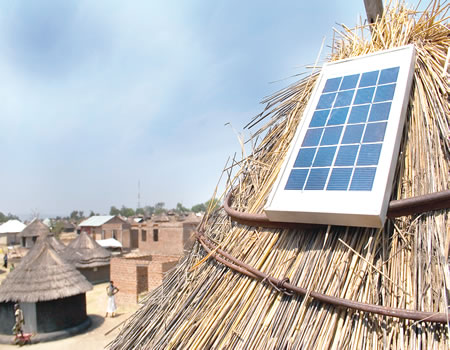For many African countries, foreign aid has been the source of most of their development especially in terms of infrastructure. A BBC Report reveals that much of Africa relies on foreign aid, despite economic growth in parts of the continent significantly outpacing the global average. Thus, even with intent to promote clean energy infrastructure development, much of Africa is still dependent on the Global Environment Fund, the Green Climate Fund, World Bank and International Monetary Fund lendings and aid from Europe and America. The Minister of State for Environment for Nigeria, Mr Ibrahim Jibril, at the 72nd United Nations General Assembly quipped that financing climate action by developing countries would require financial support from developed countries which is hinged on the $100 billion by 2020 commitment at the 21st Conference of Parties. It is this dependence on external solutions that has led critics to question the reality of clean energy and the transition from dirty fuels for a continent that is largely poor. Certainly, this concern is legitimate.
Financing has, especially in recent times, been at the forefront of the Climate Change Conference deliberations for countries in the Global South. The argument is valid; these countries contribute very little to global climate change, and yet are not allowed to go through the stages of dirty fuel development that their European and American counterparts have experienced that formed the core of their current development levels.
There is an imminent need, however, for Africa to look inward for financing. Speaking at the opening of an Expert Group Meeting on Financing Infrastructure in Lusaka, NEPAD Chief Executive Officer, Dr Ibrahim Mayaki said, “If Africa is to effectively participate and reach its true economic potential, it will require a level of investment in infrastructure that goes beyond the capacity of governments or bilateral and multilateral donor money.” He added that one of the ways Africa can indigenously finance its clean energy transition is through Public Private Partnerships (PPP).
Mr Said Adejumobi, Sub-regional Director for UN Economic Commission for Africa, had once expressed that “We are challenged to look inward in our development processes on how we use Africa’s own resources. This will deepen the private-public partnership which is crucial to growing our economy.”
Surely, there are already a number of PPP deals happening on the continent. However, they are not enough to match the money in the hands of private investors and definitely not the infrastructural deficit in the energy sector.
Energy needs are one of the most potent needs of any economy. According to a World Bank Report, Africa has about 0.04 megawatts of electricity per 1,000 people, a capacity that is less than one-third of that of South Asia, and less than one-tenth of that of Latin America and the Caribbean. PPPs in Africa account for a very small market, with the bulk of them happening in South Africa, Nigeria, Kenya, and Uganda. Together these account for 48 per cent of the 335 total PPP infrastructure projects in the region in the past 25 years. Interestingly, most of these PPPs are in the energy sector, particularly renewables, thus there is little doubt that PPPs can enable renewable energy projects.
PPPs are simply projects where the government and private sector work hand in hand sharing risks and burdens to develop the project for the benefit of the society. Indeed, the need for private sector involvement in clean energy cannot be overemphasized as various governments on the continent either do not have the financial muscle or the corporate governance, efficiency and accountability to undertake such projects from start to finish.
Public Private Partnerships have the potential to help Africa transition from an economy dependent on fossils for electricity, automobiles, agriculture and cooking to an economy with a balanced mix of various clean energy forms. This is not to obviate the obvious challenges of clean energy projects through PPP arrangements, however, there has not existed a PPP without significant risk profile and risk allocation.
Nigeria’s commercial capital, Lagos, is famous for its PPPs in various types of infrastructure including the Island Power project, a PPP between the Lagos State Government and Negris Group which is a 9.7 megawatt Independent Power Plant project serving health and judicial facilities in the state. A leaf can be borrowed from its workings, amongst others on the continent.
Evidently, PPPs have had their challenges in Africa prior to this time. In many cases, governments do not honor contracts or keep to their end of the bargain. At other times, there is dramatic change in law that frustrates the investor eventually. Yet, if countries on the continent are willing to ensure this transition to clean energy, then there has to be a proper institutional and legal framework and sectoral reforms to enable investors to invest in PPPs. Unnecessary bureaucracy and administrative barriers should also be jettisoned.
While PPPs are not the singular solution to funding the energy transition, they are proven solutions that the continent has not tapped into extensively, and if indeed we want to indigenously finance our development sustainably in Africa, it is a viable tool.
Adebayo is an Associate with S.P.A Ajibade & Co. His interests lie at the intersection of Energy, Finance and Environmental Law






